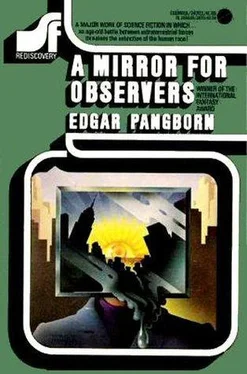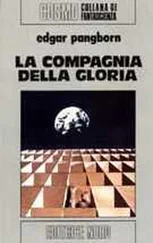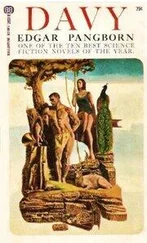I bought a science-fiction magazine in that station. They still multiply. This one happened to be dominantly grim, so I read it for laughs. Galaxies are too small for humanity. And yet, sometime…? Was our own ancestors’ terrible journey thirty thousand years ago only a hint of things to come? I understand men will have their first satellite station in a very short while, four or five years. They call it “a device to prevent war.” Sleep in space, Salvay — sleep in peace…!
No. 21 Calumet Street is an old brick house on a corner, two stories and basement, not far from the inevitable Main Street, which travels from right to wrong side of the tracks. No. 21 is on the wrong side, but its neighborhood is not bad, a residential backwater for factory workers, low-pay white-collars, transients. Five blocks south of No. 21, Calumet Street enters a slum where dregs settle to a small Skid Row, no less pitiable than the massive human swamps in New York, London, Moscow, Chicago, Calcutta.
I found a “vacancy” card in the basement window. I was admitted by the one whose life I was to meddle with. I knew him at once, this golden-skinned boy with eyes so profoundly dark that iris and pupil blended in one sparkle. Perhaps I knew him then as well as I ever shall, in that mild moment of appraisal before he had even spoken or given me more than a casual friendly glance. When we admit that the simplest mind is a continuing mystery, what height of arrogance it would be to say that I know Angelo!
He was carrying a book, his finger holding a place, and I saw he was lame, with a brace on the left ankle. He led me into a basement living room to talk with his mother, whose body, like a disguise, billowed over a rocking chair. She had been mending the collar of a shirt that sprawled as if alive on the mountain of her lap. I noticed in Rosa Pontevecchio her son’s disturbing eyes, broad forehead, sensuous mouth. “Two rooms free,” she told me. “First-floor back, running water, bath one flight up. There’s a second-floor back, but it’s smaller, maybe not so quiet — well, it’s that awful copter noise, I swear they try ’n’ see how close they can skim the roof.”
“First floor sounds all right.” I indicated a portable typewriter I had bought on impulse in Toronto. “I’m writing a book, and I do like it quiet.” She was not inquisitive nor obsequiously impressed. The boy spread his book face down. It was a paperback, selections from Plato, opened near the front to the Apology or Crito. “My name is Benedict Miles.” I kept my phony autobiography simple, to lessen the nuisance of remembering details. I had been a schoolteacher, I said, in an (unspecified) Canadian town. Thanks to a legacy, I had a year of leisure for the (undescribed) book, and wanted to live simply. I tried to establish an academic manner to go with my appearance of scrawny middle age. A shabby, pedantic, decent man.
She was a widow, I learned, managing the house alone. Its income would clearly be inadequate to pay for hired help. She was about forty, half her tiny lifetime gone. The latter half would be burdened by hard work, the gross discomfort of her flesh, many sorts of loneliness; yet she was cheerful in her chatter, outward-looking and kind. “I don’t get around too good.” Her lively hands spoke of her bulk in humorous apology. “Doing the place mornings is my limit. Angelo, you show Mr. Miles the room.”
He limped ahead of me up a narrow, closed-in stairway. This house was built before Americans fell in love with sunlight. The first-floor back was a large room and would be relatively quiet. Two windows overlooked a yard, where a pudgy Boston bulldog snoozed in the last of June daylight. When I opened a window Angelo whistled. The dog stood on her hind legs to waggle clumsy paws at him. “Bella’s a show-off,” Angelo said with unconcealed affection for the pup. “She doesn’t bark much, Mr. Miles.”
One never knows how a dog will react to the Martian scent. At least they never object to the overriding scent-destroyer. Namir had no destroyer…. “Like dogs, Angelo?”
“They’re honest.” Commonplace, but not a twelve-year-old remark.
I tested the one armchair and found the springs firm. The impress of other bodies was appealing, and gave me a sense of sharing human qualities. I tried to consider Angelo as another human being might. Two things seemed plain: he lacked shyness, and he lacked excess energy.
His father was dead, his mother not strong nor well. Premature responsibility could account for his poise. As for his quiet — I watched him as he moved about softly, drawing away a curtain in a corner to show me the hand basin and two-ring gas stove, and I changed part of my opinion. There was surplus energy, probably intense, but it was a steady burning, not dissipating itself in random muscular commotion or loud talk. “Like the room, Mr. Miles? It’s twelve a week. We rent it as a double sometimes.”
“Yes, I like it.” It resembled all furnished rooms. But in place of the customary tooth-and-bosom calendars and prints there was only one picture, an oil in a plain frame, a summer landscape of sunlit fantasy. You would as soon expect a finished emerald in the five-and-dime. “I’ll take it for a week, but tell your mother I hope to be here longer than that.” He took the money, promised to bring keys and a receipt. I tried a wild shot: “Have you done many paintings like that, Angelo?” A flush spread on his cheek and throat. “Isn’t it yours?”
“It’s mine. A year ago. Don’t know why I bother.”
“Why shouldn’t you?”
“Waste of time.”
“I can’t agree.” He was startled, as if he had been braced to hear something else. “I admit it wouldn’t please the modern cults, but so what?”
“Oh, them.” He recovered, and grinned. “Sissy though. Kid stuff.”
I said: “Nuts.” And watched him.
He fidgeted, more like a twelve-year-old now. “Anyway I don’t think it’s very good. I don’t hear that birch tree.”
“I do. And the grass under it. Field mice in the grass.”
“Do you?” Neither flattered nor quite believing it. “I’ll get your receipt.” He hurried, as if afraid of saying or hearing more.
I was unpacking when he returned. I let him see my clutter of commonplace stuff. The hair dye to keep me gray passed for an ink bottle. The scent-destroyer was labeled after-shaving lotion and would smell like it, I understand, to a human nose. The mirror was wrapped. The flat grenades were next to my skin of course. Angelo lingered, curious, willing to get acquainted, possibly hurt because I volunteered nothing more about his painting: bright as he was, he wouldn’t have outgrown vanity at twelve. He asked innocently: “That typewriter case big enough for your manuscript?”
Too smart. When I decided that Mr. Miles was puttering at a book I neglected to pick up anything but the typewriter and packages of paper still unopened. “Yes, it is for the present. My book is mostly here.” I tapped my head. I knew I should dream up some mess of words, and soon. I didn’t think he or his mother would poke among my things, but one tries to avoid even minor risks. Fiction? Philosophy? I sought the armchair and lit a cigarette (again I recommend them to Observers deprived of our thirty-hour periods of rest: smoke is no substitute for contemplation but I believe it softens the need). “School finished for the year, Angelo?”
“Yeah. Last week.”
“What year are you? Shut my mouth if it’s none of my business.”
A smile flashed and faded. “Sophomore.”
The average age in that class would be around sixteen. He would be holding himself back, I knew, in self-defense. “You like the Crito?”
Alarm was obvious in the studied blankness of his face. “Ye-es.”
Читать дальше












